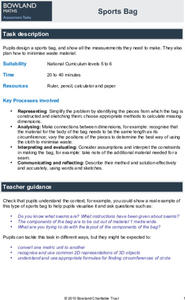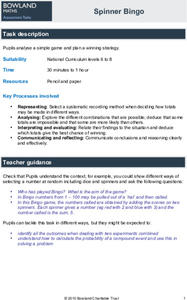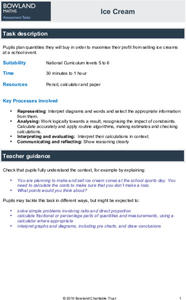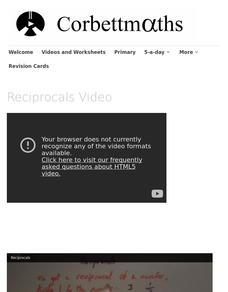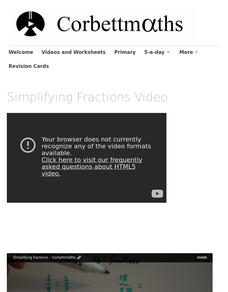Texas Education Agency (TEA)
Credit Scores and Your Financial Future
How important is a credit score, anyway? Scholars view a PowerPoint and take notes about credit scores. Next, they write essays explaining their plans for achieving a good credit score.
Texas Education Agency (TEA)
Identity Theft and Credit Safety
Deter, detect, defect. Pupils watch a PowerPoint presentation and video about identity theft and credit card safety, taking notes to use later. Next, they develop a plan for maintaining credit safety and write an essay about the...
Bowland
Taxi Cabs
Determine the cheapest way to the airport. Pupils read a scenario about trying to get 75 people to the airport using two different sizes of taxis. Learners calculate the number of smaller taxis needed given a number of large taxis and...
Bowland
Sports Bag
Lay it out using the least amount of material. Learners use the dimensions of a cylindrical sports bag to find out the size of pieces of material needed to sew them. The pupils find the best placement of the pieces to use the least...
Bowland
Spinner Bingo
Create a winning card. Given a description of a bingo game using two spinners, pupils determine which of three cards has the greatest chance of winning. Scholars then determine which are the best numbers to put on their own cards to give...
Bowland
Security Camera
Take an overall view of percentages. Pupils determine whether a shop owner's claim is correct about what percent of his shop is viewable from the installed security camera. Learners try to find whether there is a better location for the...
Bowland
Patchwork Cushions
Find out if there are enough squares. Given diagrams for the first four figures in a sequence, pupils try to determine the next figure. Individuals find the number of square and triangle pieces of fabric that are required to make...
Bowland
Ice Cream
Make sure there is enough ice cream on hand. Learners try to find out how much ice cream to buy for a sports event. Scholars use a pie chart showing the percent of a sample of people who like different flavors of ice cream. Using the...
Bowland
Hot Under the Collar
It is close enough for all practical purposes. Pupils see two methods to convert degrees Celsius to degrees Fahrenheit, one with exact numbers and another using estimation. Learners review both methods and determine when the estimation...
Bowland
Counting Trees
Let's find a way to determine how many there are. Given a diagram of trees on a plantation, pupils devise a way to estimate the number of old and new trees. Using their methods, learners create estimates for the number of the two types...
Bowland
Lottery
Take a chance on raising money. Learners calculate probabilities to determine whether a lottery is a good way to raise money. Pupils determine the number of combinations of choosing two numbers between one and six. Using the sample...
Teach Engineering
Powering a Device Using Food
Eat up a resource on using food to power electrical devices. Future engineers first experiment with different fruits and vegetables to determine the amount of electrical energy they provide. Based on the data, they design and create an...
Las Cumbres Observatory
How Big is the Solar System?
Find out if it's possible to travel to the edge of the solar system. Learners use a piece of string to model the distance between planets in the solar system. They then use the distances to calculate how long it would take to travel to...
Las Cumbres Observatory
Plotting an Asteroid Light Curve
Data can tell us a lot about celestial objects that are just too far away to study otherwise. Learners examine data on the brightness of an asteroid to predict its rotation rate. Graphing the data reveals a periodic pattern that allows...
Las Cumbres Observatory
Plotting a Supernova Light curve
Supernovas burn for a short time but can give scientists extensive information about the universe. Learners analyze given data about the change in the light magnitude of a supernova. They look for patterns in the data and use them to...
California Academy of Science
Modeling Eclipses with Size and Distance Scales
Size within the solar system is a difficult thing for pupils to imagine. Using everyday objects, they build models to show the scale between the sun, moon, and Earth. They situate their props in proportional distances between the objects...
Corbett Maths
Fractions Shapes
Let the class color. The video shows two different types of fraction of shapes problems. Pupils learn to shade a given fraction of a shape along with determining the fraction of a shape that is shaded. Learners practice the skill with...
Corbett Maths
Reciprocals
Reciprocals is more than just flipping a fraction. Pupils watch a video to see how to find the reciprocal of any number. Individuals practice finding reciprocals of numbers including whole numbers and decimals.
Corbett Maths
Increasing or Decreasing by a Fraction of a Quantity
Calculate fractional changes in numbers. Pupils watch a short video on determining the cost of a shirt after it has been reduced by a fractional amount. Scholars use worksheets to practice calculating increased and decreased amounts.
Corbett Maths
Mixed Numbers to Improper Fractions
Mix things up a little to be improper. The presenter shows three example of changing a mixed number to an equivalent improper fraction. Scholars work several practice problems and application questions to refine the process.
Corbett Maths
Simplifying Fractions
Put fractions in simpler terms. Learners watch a video showing how to simplifying fractions. They then work through two worksheets to practice the skill.
Corbett Maths
Improper Fractions to Mixed Numbers
What's the proper way to convert fractions? A short video shows three quick examples of converting an improper fraction to a mixed number. Pupils practice doing their own conversions to better understand the skill.
Corbett Maths
Multiplying Fractions
Multiply straight across. A video shows straightforward examples of multiplying fractions by multiplying the numerators and the denominators. Pupils practice the skill and give their answers as simplified fractions.
Radford University
Connecting Theoretical and Experimental Probability
Play some games, develop a law, and then call it a day. Learners first perform a small number of trials for a probability experiment, then predict the result for a larger number of trials. They then compile data from the entire class to...



